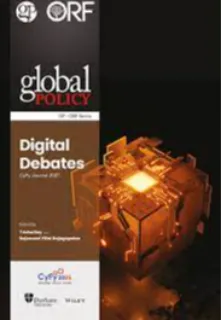The most enduring idea from George Orwell’s 1984 is that even as we design and produce language, we are shaped in turn by the language we use—words are crucial in explaining complex ideas and in the process of meaning-making. The dynamic and fast-evolving world of technology, innovation, politics, and security sees the equally frenetic adoption of catchphrases. ‘Cyber sovereignty,’ ‘geotech,’ ‘ethics washing’ and more are fast becoming common lexicons, deployed differentially and differently. Sometimes used with care and thought, and on most occasions with an incomplete understanding of the distinct contexts that shape their use.
‘New normal’ was one such phrase that captured a collective experience, marking an apparent inflection point in our relationship with technology. Yet the term masks the fact that the world we are entering carries many of the same fissures, fractures and fallibilities of the past decade. Or is the encoding of the cleavages of the past in our digital future the ‘new normal’?
Conflicts in a Connected World
The past year has brought several complex questions to the fore: Should platforms be able to take decisions that challenge sovereign laws or reinterpret them? Is there a fundamental tension between the global reach of digital giants and the fact that they are primarily shaped by the mores and cultures of small, isolated communities, and subject to the laws, political processes and ethics of the country they are headquartered in? And are global digital norms and values achievable or even desirable?
Our contributors analyse the ongoing ‘battles’ between the old giant, the many-limbed Leviathan (the State) and the new five-headed giant comprising of technology corporations that shape how we consume, interact and generate value online. The narratives around a ‘third way’ and propagation of the concept of ‘cyber sovereignty’ point to a new anxiety that grips nations and communities globally. These drivers are compelling them to autonomously forge a path in the Fourth Industrial Revolution amid tensions between the world’s two largest economies, the US and China, and to escape the virtual monopoly of a handful of tech giants.
Governments on their part are ‘byting’ back. Nikhila Natarajan’s essay chronicles the falling out between Capitol Hill and Silicon Valley, one of the few unifying clarion calls that cuts across political lines in the US. Nisha Holla, meanwhile, advocates for countries like India carving their own space in the technology revolution, championing national alternatives to foreign tech giants.
On this note, our digital debates pivot to rules of the road. Principles for digital and emerging technologies are gradually gaining traction across multilateral and multistakeholder forums, yet there remains considerable ground to be covered to transform these disparate statements into unifying courses of action for state and non-state actors alike. The path ahead is not an easy one. While international norms are built upon consensus, the winds of geopolitics have paralysed decision-making at international forums and institutions.
Daniel Porras describes such a state of affairs in space security, with processes at the UN Conference on Disarmament and the UN General Assembly failing to achieve any kind of middle ground. Even as space security talks stall, Victoria Samson adds to the milieu of strategic threats arising from the intersection between space and nuclear. Philip Reiner dives into the history and current rise in ransomware attacks, emphasising that networked threats require networked solutions, and no one organisation can take on ransomware alone. Nivedita Raju stresses on the urgent need for international governance tools to manage the race to the moon. Smriti Parsheera, using the example of AI norms, describes how, in the absence of achievable consensus, global norms conversations are happening through a variety of non-binding coalitions of the likeminded and soft partnerships. Parsheera asks, however, if these “like-minded” coalitions will become counterproductive, leading to the creation of fragmented frameworks. Arindrajit Basu delves further, in a way questioning the apparent binary between democracies and non-democracies, using the example of foreign intelligence operations to ask whether extraterritorial surveillance by democracies like the US is congruent with the democratic norms they purport to promote.
Similarly in cyberspace, our authors fall along a spectrum when it comes to the conflict between the different ideologies and groups of actors. While Abagail Lawson sees value in cyber norms as tools for managing conflict, James Lewis says that it is high time that norms be translated into repercussions for bad actors. “Reducing the level of conflict,” he says, “requires not only norms but consequences for the failure to observe them.”
As always, in the great battle of norms, narratives, and behemoths of our digital age, the fact is that it is the everyday lives of communities and individuals that are becoming indelibly linked to technology tools. In the macro world of bits, bytes and algorithms, our contributors caution against losing sight of the human lives at their centre, each with distinct identities, aspirations and needs. As Paul Cadario asks, “Unlike a physical universe operating according to the laws of science, what social and ethical principles would underpin a new, technology-enabled ecosystem to make it sustainable, inclusive, and fair, and keep it that way?”
Even after nearly two years of the COVID-19 pandemic, these interweaving issues remain unresolved. Abhinav Verma’s piece on bias in AI in healthcare highlights how the false binaries of gender are force-fit into a binary world of 0’s and 1’s, leaving individuals with gender identities that fall along the spectrum in the lurch. Samuel Neufeld and Sridhar Ganapathy believe that one solution to better technology-led processes is the creation of an open data ecosystem, but who should lead and fund the creation of this ecosystem? Should it be the State? Should it be a private company, or perhaps a separate ‘neutral’ entity? If access to these datasets is still price-gated, is it truly ‘open’ and in the best interest of users?
This year’s Digital Debates delve into our uneven path toward several possible tech futures, many of which are marked by inequities along the lines of access, capacity, agenda-setting power, and capital. And while the precise contours of our morrows will always remain unknowable, the essays in this journal and the discussions they feed into at CyFy attempt to critically examine and debate issues at the intersection of technology, security and society, and on occasions bravely offer a suggested approach to adopt.
Read the report here.
The views expressed above belong to the author(s). ORF research and analyses now available on Telegram! Click here to access our curated content — blogs, longforms and interviews.

 PDF Download
PDF Download



 PREV
PREV



